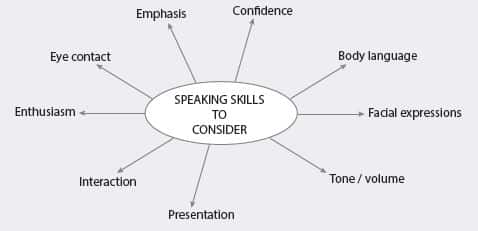When you take your KS3 English examinations, you’ll be assessed not only on your ability to use grammar, punctuation and spelling, but also your ability to communicate via spoken English. In this blog, we’ll provide you with some top tips on how to improve your English speaking skills, via body language.
English Speaking Skills: Assessment Criteria
At KS3, pupils will be taught how to:
- Verbally communicate to a high standard by conveying confidence, fluidity and personality.
- Improve their speaking by engaging with different word choices and language techniques.
- Participate in verbal debates, discussions and presentations.
- Demonstrate effective spoken English by improving speaking skills such as volume, tone, enthusiasm and interaction.
All of these play a fundamental role in developing your English speaking skills. Although there will not be a test about verbal communication, it is important that you are able to demonstrate great speaking skills, in order to enhance your learning and become a confident speaker.
Below is a diagram of all the key skills you should focus on in order to improve your speaking abilities.

Body Language
When speaking in any language, your body language makes a huge difference to the way you come across. Body language is an important part of communication. Below we’ve compiled a list of key body language and mental techniques to work on, with the aim of improving your English speaking skills.
Confidence
Confidence is key in any situation that requires you to speak out loud. Particularly if you have to talk to a new or large group of people, it is important that you convey as much confidence as possible. Confidence will not only show people that you know what you are talking about, but it makes the thought of public speaking a little less daunting.
How to improve your confidence:
- Practise! The more practice you undergo, the more confident you will become.
- Practise by yourself and with other people.
- Practise in front of a mirror.
- Understand that everyone makes mistakes. You’re not expected to be perfect.
- Understand your strengths and weaknesses and work on those weaker areas.
- Ask for feedback and learn from what people tell you.
- Stay positive.
Posture
The way you stand and the way you come across to the audience is another significant factor. Body language will exert confidence. Of course it depends on the type of situation you are in and the people you are presenting to. Are you presenting to a group of friends? Or are you giving a formal speech? Make sure you stand/sit upright, as much as you can. Avoid moving your arms too much. Place your hands down by your side.

Facial Expressions
Your face needs to look engaging with both the content of your speech and the audience. Some people have a very expressive face, and this helps them to convey meaning.
How to convey facial expressions:
- Use a mirror and practise your facial expressions.
- Create links between your content and your face. For example, if you are speaking about something serious and sad, you would want to avoid happy facial expressions.
Tone/Volume
The tone and volume of your voice plays a key factor in how you come across in verbal communication. You need to understand how tone and volume of your voice can change the ambience of both the room and the content in which you are speaking.
How to improve tone and volume:
- Practise speaking at different volumes. If you are addressing a large audience, you will need to make sure that the people at the back of the room will be able to hear you.
- You want to avoid sounding monotonous. Just like singers have different tricks and tones with their singing voices, everyone’s speaking voice can be changed so that they don’t have just one tone.

Presentation and Interaction
This is one of the biggest things you will need to work on. Public speaking requires you to have great presentation skills. When it comes to presentation, this includes everything:
- Body language
- Expressions
- Enthusiasm
- Interaction
- Eye contact
All of these make up your overall presentation skills. The best way to practise presenting is to undergo lots of sample presentations. These don’t have to be anything formal. Simply practise with a friend or family member – talk to them about a particular topic, and try to remember the aforementioned techniques.
Enthusiasm
In order to avoid sounding dull, you will want to make sure that you sound engaging. To do this, you will need to sound enthusiastic. You can look and sound enthusiastic by drawing on all of the other speaking skills mentioned in this section.
Eye Contact
When speaking, it is considered polite to look people directly in the eye. However, this can be difficult if you are talking to a large number of people.
Effective eye contact:
- You need to avoid looking at the floor or quickly gazing around the room.
- If you’re talking to one person, regularly make eye contact.
- If you’re talking to a large group of people, try not to focus on just one person. Scan the room slowly. This will demonstrate that you are making an effort to make everyone feel included.
Emphasis
When speaking, a great technique to learn is to add emphasis in your speech. This can be done in a number of ways:
- Add pauses for dramatic effect.
- If there is a certain word or phrase that you want to add more emphasis to, you can say it differently.
- You can emphasise certain words by using gestures. You can practise adding emphasis to your speaking in order to become an effective speaker.
Products You Might Be Interested In
For more tips on how to improve your KS3 English speaking skills, check out our incredible guide on Spoken English. Jam packed with advice on how you can improve your scores, this is the ultimate resource for KS3 English students.



Very helpful blog.
Thanks for sharing with us.